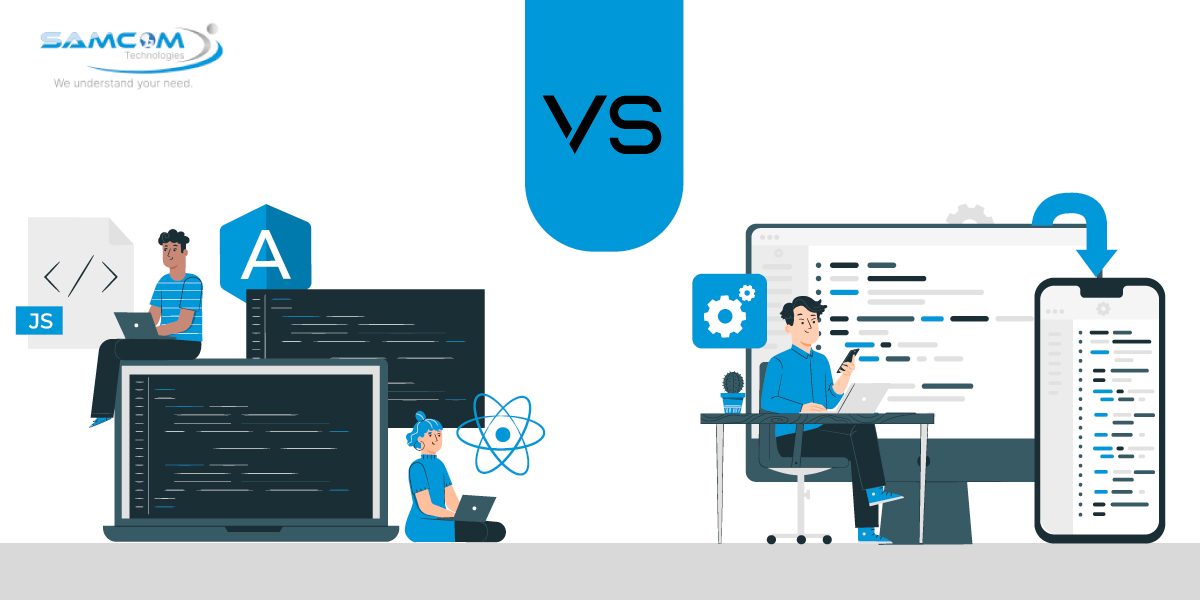
Blog
Native Vs Cross-Platform Development: You Must Know the Advantages & Disadvantages

App development is integral to providing the best experience to the users and ensuring that their varied needs are fulfilled. There are two ways in which apps are developed – Cross Platform and Native Platform development. Native development is the process of building apps from the start using programming languages and tools which are specific to the platform. This helps take full advantage of the platform’s capabilities and optimise the app’s performance. On the other hand, cross-platform development is one in which reusable and web-based codes are used to develop apps that can run across different platforms. You can free to communicate with best mobile app development company to build android application for your business.
This article presents the advantages and disadvantages of both forms of app development.
Advantages and Disadvantages of Cross and Native Platform Development
1. Simplicity
Cross-platform solutions use languages such as JavaScript, C#, or Dart as the main programming languages. As more developers use and work with these languages, these are much simpler to learn and implement during the app development process. In contrast to it, programming languages such as Java and Kotlin for Android development and Swift and Objective-C for iOS development. These languages are not only difficult to learn but also challenging to implement. Therefore, the most significant advantage of cross-platform development is the use of simple and accessible programming languages.
2. Speed and cost of development
In terms of speed and cost of development, cross-platform solutions are more effective. This is another crucial advantage of cross-platform development. You need to hire only one team of developers that can create apps that will look the same on both Android and iOS devices. This advantage can give you a distinctive edge when developing an app that can run both platforms.
However, this is not the case with native development because you can create an app for a particular platform. By using cross-platform development, you can, to a certain extent, beat your competition because you can create an app that can run on any device and provide the best user experience.
3. Safety
While developing and using an app, safety is a cause of primary concern. The developers must ensure that the app does not have any safety-related issues and aspects. In this regard, cross-platform solutions could be more effective. The main reason behind this is that such solutions usually have open-source code and can be accessed by anyone who knows how to find them.
Due to this reason, apps created and developed with such a programming language can be easily hacked, altered, or modified, creatingsignificant safety concerns for the users. Therefore, safety is a significant drawback of using cross-platform development, as opposed to native platform development, which is far safer and more secure.
4. Speed and responsiveness of the interface
In terms of speed and responsiveness of the interface, both the cross-platform and native development solutions fair nearly the same. However, it has been observed that the speed of cross-platform solutions is lower than that of native solutions. Due to this reason, there are chances that the users might not be able to fully enjoy an app developed through cross-platform programming language like JavaScript or C#, as compared to an app developed through native programming languages such as Objective-C or Java. On the other hand, native-written apps are much faster and more responsive to the users, providing them with a better experience.
5. Functionality
The usability and functionality of cross-platform apps are more than the apps written through native programming languages. It is far easier to add new features, functions, and features in a cross-platform app instead in a native-platform app. In addition, fixing bugs in a cross-platform app is less cumbersome and can be easily and quickly applied to all platforms. As a result, the overall functionality of cross-platform apps increases significantly, thus making them more beneficial for users.
6. Life cycle of the software
Native development helps significantly increase the overall lifecycle of the software. This way, the overall experience of the users can be enhanced significantly, which then can help in increasing their overall level of satisfaction as well. It happens mainly because natively written apps prolong the life of the software because it is optimised as per the hardware and thus can function effectively, providing the best results and experience to the users.
However, cross-platform apps are different from the case because they cannot be optimised to form a synergy between the software and hardware. Due to this reason, the overall life cycle of the software or app developed through cross-platform solutions is lower.
Final Thoughts
Apps form an integral part of our daily lives. In recent years several ways for app development have emerged; two of the most popular ones are cross-platform and native-platform development. In the current article advantages and disadvantages of both methods were presented. Here it can be said that native platform development is a better way, even though it may be expensive and time-consuming. However, this decision ultimately depends on the objective of the company and its plans. Connect with the best flutter app development company to make attractive and eye-catchy mobile application.


We are committed to providing superior custom software development solutions that meet your business requirements.
Address
India
18 – 19, 4th Floor, 4D Square Mall, Motera, Ahmedabad 380005, India.
Canada
3030, Boul Le Carrefour, Laval, QC H7T 2P5, Canada.
USA
340 S Lemon Ave. #7784, Walnut, California, 91789, United States.
Contact Us
Mon to Fri 10.00 AM - 8.00 PM
Copyright © 2012-2024. All Rights Reserved by Samcom Technologies.